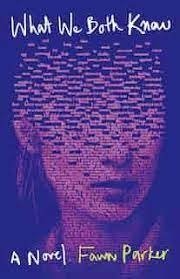“The Monster Who Lived Between Their Bodies”: Review of Fawn Parker’s What We Both Know
Fawn Parker, What We Both Know
Penguin Random House, 2022. $20 CAD
Order a copy from Penguin Random House
Baby Davidson, a famous Canadian writer who took his pen name from a mistake made on his adoption certificate, is dying. Suffering from Alzheimer’s, he’s losing the capacity to write a long-awaited memoir of his celebrated life. He tasks his middle-aged daughter, Hillary Greene, with the task of writing it for him, a secret to be strictly kept between the two of them.
Fawn Parker’s latest novel What We Both Know follows on the thematic course set by her other work. Her previous novels, 2019’s Set-Point and 2021’s Dumb Show, showcase female protagonists dealing with grief caused by an ill or deceased parent, as well as how patriarchy functions in both small communities and larger institutions. In What We Both Know, both of these themes are dialed up to an intensity that, while at times difficult to read about, ultimately reveal necessary and important truths about familial trauma.
While it’s publicly known that Baby had affairs with underage students during his time as a creative writing instructor, during her research for the memoir, Hillary realizes a disturbing family secret: that her father was sexually abusing her sister, Pauline, when the two were children. This truth is made even more difficult by the fact Hillary is still grieving Pauline, who died by suicide only a year prior.
A core theme of the novel is how men with institutional power remain lauded regardless of their behaviour. This theme is showcased in ways both overarching and granular. For instance, Hillary notes that the former head of the creative writing department still keeps a shelf of Baby’s book in his office, despite Baby being forced to step down from the position. Likewise, it’s not a coincedence on Parker’s part that Baby often watches reruns of Charlie Rose, as the real life talk show host was fired after multiple women reported he had sexually abused and harrassed them.
Following this larger theme, What We Both Know wrestles with how trauma affects memory. While Baby is slowly declining due to Alzheimer’s, the more time Hilary spends working on the memoir, the more information she recalls. As Parker writes, “It’s as though the more he forgets the more I remember” (167). Recalling a moment in childhood where she saw Pauline in the hallway at night, Hilary grapples with the idea that she knew about the abuse happening in her home, but blocked it out to keep herself safe at the expense of her sister.
In this way, the novel also struggles with ideas of complicity. As Hilary puts the pieces of her family’s traumatic secrets together, she contends with what to do about it. Being his daughter, Hilary has enjoyed many privileges of Baby’s success, including working in the creative writing department he taught in. However, as the novel progresses, Hilary realizes that to remain silent would be to further hurt Pauline’s legacy.
Parker’s clean and exacting writing, while excellent in her previous novels, soars to new heights in What We Both Know. Grappling with Hillary’s decision to expose her father, Parker’s prose ignites in the finest passage of the novel. She writes, “The truest thing about him, the core of him, was what he did to her, what I know but cannot put to words. But I will. And with the unleashing of her truth, it will be understood that he died when she died. She is the only one who saw him for who he was in his entirety, the monster who lived between their bodies. I will make this clear” (86).
Parker’s sophisticated grasp on her work is also clear in the excerpts from the memoir-in-progress itself. Writing in her father’s voice, the reader sees sample chapters from the manuscript Hillary is working on. These excerpts are wholly believable, showing Parker’s range when it comes to inhabiting different voices in the text. Even when they describe stereotypical behaviour of male writers, the prose is all-too authentic. For example, one passage states, “My crotch would lead me upstairs, or into a cab, or into a hotel bathroom” (113). It’s a testament to Parker’s talent that these sections come across as convincing rather than clichéd.
While Hillary spends the majority of What We Both Know struggling with what to do about her father’s legacy, in the final pages, the truth is set free. It’s a surprising yet satisfying ending to a novel that reflects on how the ghost of patriarchal power looms over all facets of a woman’s life, both private and public.
Alanna Why is a fiction and culture writer from Ottawa. She is the author of the novella Amy Of Suburbia, about a 12-year-old girl's obsession with Green Day. Her book reviews have appeared in Canthius, PRISM and Minola Review, in addition to her newsletter, Why's World. Alanna currently lives in Montreal.


